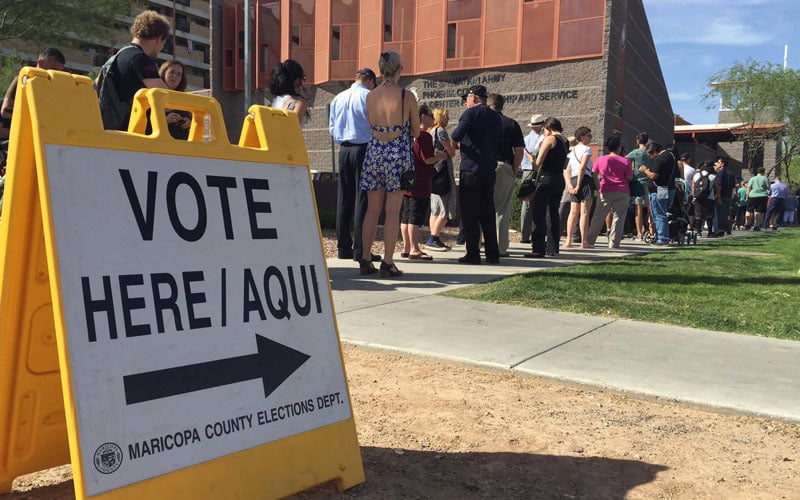WASHINGTON – A divided federal appeals court rejected Democratic challenges to two Arizona voting laws Wednesday, upholding a lower court that said the rules put a minimal burden on voters and there was no evidence they were aimed at minority voters.
A three-judge panel of the 9th U.S. Circuit Court of Appeals said the Democratic National Committee could not produce “a single voter” to testify that it was harder for them to vote because of the state’s “ballot-harvesting” law, which limits who can turn in another person’s ballot.
The court also said that the state’s rule that eliminates ballots cast outside a person’s assigned precinct does not impose a burden on voters, and that it is outweighed by the state’s need to conduct orderly elections.
Judge Sidney Thomas disagreed in a sharply worded dissent, saying the laws in question “serve no purpose aside from making voting more difficult and keeping more African American, Hispanic and Native American voters from the polls than white voters.”
He said that under the majority’s reasoning, literacy tests and poll taxes could stand, even though they disenfranchised minority voters, as long as they were evenly applied across racial and ethnic lines.
The ruling was the latest in a case that began before the 2016 elections, when state and national Democrats sued over the out-of-precinct rule and HB 2023, which was passed earlier that year by the Legislature.
HB 2023 makes it a felony for anyone other than a family member, caretaker or postal worker from collecting another person’s ballot and turning it in to election officials.
Supporters of the law said it was aimed preventing voter fraud but critics said it will disproportionately affect minority voters, who often have a harder time getting to the polls and rely on someone else to deliver their ballot for them.
Alex Gulotta, Arizona state director of voting rights group All Voting is Local, said the state’s Native American population is particularly hard hit by HB 2023, since many live in rural areas where spotty transportation makes it difficult to deliver their ballots.
The ballot-harvesting law was briefly blocked by courts in the week before the 2016 presidential election, with a series of back-and-forth rulings until the Supreme Court stepped in on the Saturday before Election Day and allowed the law to take effect.
The case subsequently went back to district court where, after a 10-day trial that included 230 exhibits and testimony from 51 witnesses, the court ruled this May that the laws were not unduly burdensome on voters’ rights or made with discriminatory intent.
The appellate panel agreed to expedite the DNC’s appeal of the case with an eye toward the now-looming 2018 elections.
In the majority opinion, Circuit Judge Sandra Ikuta said the appeals court could only reverse the lower court if it found clear error in its determination of the facts. But Ikuta praised the district court’s fact-finding and said the appeal from the DNC amounted to “a request that we reweigh and re-evaluate the evidence in the record.”
Thomas disagreed, citing pages of statistics that he said prove the state’s voting rules “had a disproportionate effect on racial and ethnic minority groups.”
Out-of-precinct voting “is concentrated in relatively dense precincts that are disproportionately populated with renters and those who move frequently,” he wrote.
He noted that Arizona throws out a far greater percentage of out-of-precinct ballots than any other state in the country, which he attributed in part to frequent movement of Arizona polling places, particularly in Maricopa County.
“The paths to polling places in the Phoenix area is much like the changing stairways at Hogwarts, constantly moving and sending everyone to the wrong place,” Thomas wrote.
Gulotta said he was “disappointed” by the decision, but not surprised in light of a 2013 Supreme Court ruling that loosed federal oversight of state voting laws under the Voting Rights Act.
“It’s given much more freedom to states to exclude people they want to exclude in the electoral process,” Gulotta said.
Neither side said Wednesday that they expect this to be the end of the fight.
The Arizona Democratic Party, one of the plaintiffs, said in a statement it is “committed to improving access to the ballot for qualified voters.”
In a statement from his office, Attorney General Mark Brnovich said that he was not surprised by the ruling, but expects the plaintiffs “will continue their lawsuit, and we will in turn continue our duty to faithfully defend the law passed by the legislature.”
